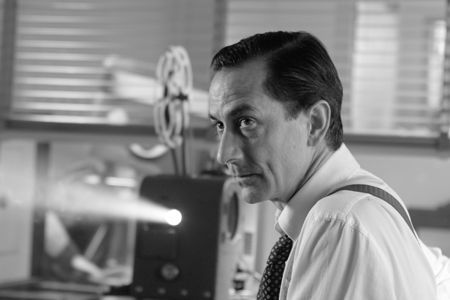|
Reviews of Recent Independent, Foreign, & Documentary Films in Theaters and DVD/Home Video
Directed by: George Clooney. Produced by: Grant Heslov. Written by: George Clooney & Grant Heslov. Director of Photography: Robert Elswit. Edited by: Stephen Mirrione. Released by: Warner Independent. Country of Origin: USA. 90 min. Rated: PG. With: David Strathairn, Robert Downey, Jr., Patricia Clarkson, Ray Wise, Frank Langella & George Clooney. The crusading spirit of director Stanley Kramer (Judgment at Nuremberg) lives on in director George Clooney's matter-of-fact but ardent dramatization of the showdown between red-bating Senator Joseph McCarthy and CBS news pioneer Edward R. Murrow. With the help of the melancholy jazz score, the noir-like black-and-white cinematography instantly transplants the viewer to the time of cigarette commercials and loyalty oaths. The private lives of the real-life news personalities remain offstage, with the exception being the marriage of two journalists, which had to be kept secret because of workplace regulations (it was the worst kept secret in the news room). The focus is, instead, on Murrow as he takes on McCarthy. For his program See It Now in 1953, Murrow investigated the firing of Lt. Milo Radulovich, an Air Force reservist discharged - without a trial - for being deemed a security risk because members of his family were allegedly communist sympathizers. Clooney wisely builds his own case against McCarthy by letting the senator and his actions speak for themselves through seamlessly blended footage from Murrow's program and the hearings of the House Un-American Activities Committee. The film is at its most riveting in these sequences, especially Annie Lee Ross' testimony before HUAC, as she's being questioned by Roy Cohn. Ross, a middle-aged African-American civil servant, had been accused of being a communist spy, based on the unsworn testimony of unknown accusers.
The film soundly states its points: the obligation of a vigilant
press, the distinction between dissension and disloyalty, and the warning of
fear mongering for political means. (There are no explicit correlations between this time period
and the current political climate.) Clooney may be preaching to the choir,
but his sermon is rousing without pandering. Playing Murrow's producer,
Clooney's congenial star power never overwhelms but fits right into the
ensemble. With a cigarette permanently attached to his hand, David
Strathairn's dry and debonair Murrow dominates, though he does get
competition from the biting sarcasm and impeccable timing of Frank Langella
as CBS chairman William S. Paley. And the lean script moves smoothly at a
clipped pace. It may, in fact, be too lean - numerous interludes of jazz
singer Dianne Reeves and her band feel like padding. But not since All the
President's Men has journalism come across as this heroic. Kent Turner
|
